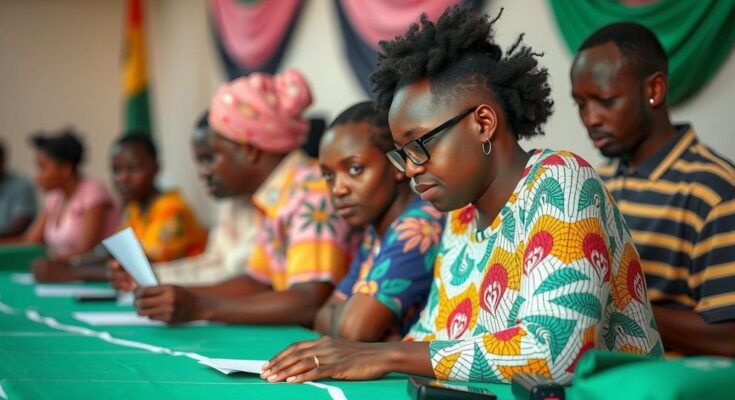Ghana’s election day has arrived, presenting voters with the choice of a new president amid economic challenges such as a debt crisis and high inflation. Former President John Mahama of the NDC and Vice-President Mahamudu Bawumia of the NPP are the key candidates. Voters face critical decisions against a backdrop of socioeconomic uncertainty. Polling takes place today, with results expected within three days, potentially leading to a run-off if no candidate secures over 50% of the vote.
Election day has arrived in Ghana, marking a pivotal moment for the West African nation as citizens prepare to vote for a new president. The economic challenges, notably a debt crisis and soaring living costs, weigh heavily on the electorate’s minds. Nana Akufo-Addo, having served two terms, will not seek re-election, assuring the nation a new leader. The frontrunner is expected to be former President John Mahama, who is attempting a comeback as the candidate for the National Democratic Congress (NDC). He faces stiff competition from Vice-President Mahamudu Bawumia of the New Patriotic Party (NPP), who would make history as the nation’s first Muslim president if successful.
Ghana has registered nearly 19 million voters, amidst ongoing efforts to enhance female representation in politics. However, the only female presidential candidate, Akua Donkor, has passed away, and her name will remain on the ballot due to her potential successor being disqualified. This election also involves parliamentary selections across 275 constituencies. Historically, candidates from the NDC or NPP alone have held the presidency since the reintroduction of multi-party politics in 1992, with no party having achieved more than two consecutive terms.
Polling stations will be open from 07:00 GMT to 17:00, providing a ten-hour window for voting. For a candidate to secure victory in the first round, they must obtain over 50% of the votes, otherwise, the top two candidates will proceed to a run-off by the end of December. In a recent statement, Bawumia claimed, “What is clear is that notwithstanding the challenges we’ve had, we have performed better than the government of John Dramani Mahama,” contrasting Mahama’s narrative, who urged voters to choose, “a Ghana of opportunity, prosperity, and justice for all.”
An alarming rise in inflation, peaking at 54.1% in 2022, has exacerbated poverty levels, making it a critical focus for many voters as Ghana grapples with its economic realities, including a delayed resolution on debt restructuring with international creditors and high unemployment rates, particularly among the youth.
Additional reporting by Damian Zane.
The elections in Ghana are significant, as they occur amidst economic turmoil characterized by a debt crisis and increased living costs, which have affected public sentiment. This election is particularly notable as Nana Akufo-Addo concludes his term after a constitutionally mandated limit of two terms. The contest is majorly influenced by the candidates from the two dominant political parties, the NDC and the NPP. The unique aspect of this election also includes the historical context of voting practices in Ghana and the role of women in politics, especially following the death of the lone female candidate. Voter engagement, especially among the youth, holds substantial importance given the socioeconomic challenges that many face today.
In conclusion, Ghana’s latest election serves as a critical juncture for the nation, with voters contending with acute economic hardships while choosing a new leader. It highlights the historical dichotomy between the two leading parties in a politically charged environment, further complicated by issues of representation. The outcome will have lasting implications for Ghana’s future, particularly as it navigates fiscal challenges and seeks to promote inclusive governance.
Original Source: www.bbc.com




